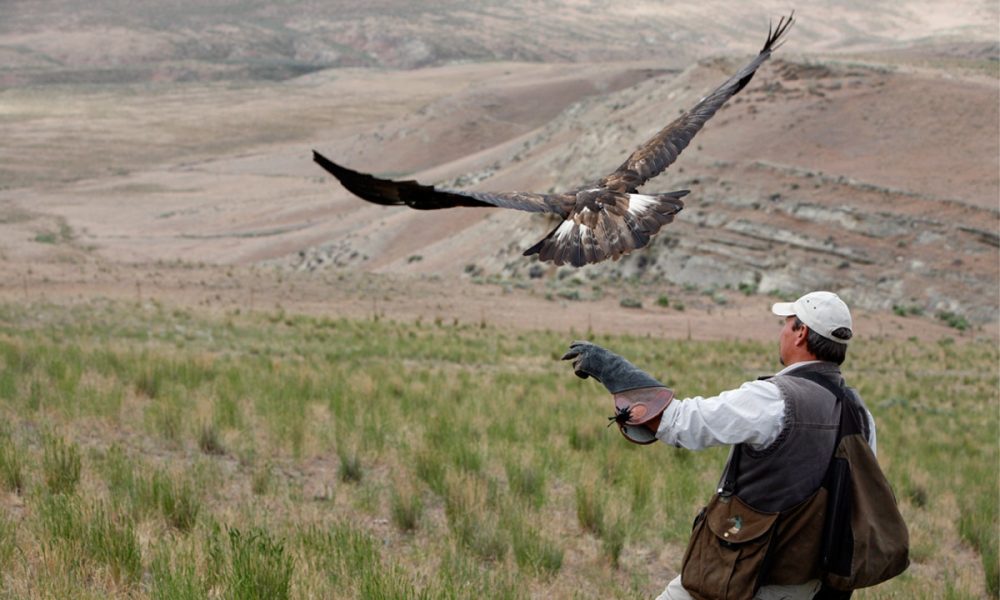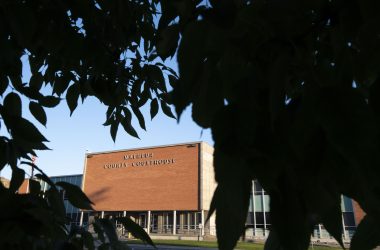 Joe Atkinson releases a golden eagle into the sky. (Submitted photo)
Joe Atkinson releases a golden eagle into the sky. (Submitted photo)
VALE – It’s 1976 and there is a baby golden eagle in the middle of the Atkinsons’ kitchen table. The raptor, which will be intimidating when full grown, resembles a puffed-up cotton ball. It’s falconer Joe Atkinson’s first golden eagle and he’s determined to raise it in the house – until one day, the bird shoots its poop so far across the kitchen it splatters against the toaster.
His wife, Cordi, promptly vetoes raising raptors in the house.
The Atkinsons, master falconers for more than four decades, now live on their 530-acre “fortress of solitude” near Vale.
The couple are a world-renowned team, having been commissioned to fly birds for National Geographic, BBC, PBS, Nature and many other productions. The list includes a documentary for which they were asked to train the most rare eagle in the world, the Philippine eagle — a massive raptor that preys on primates in the jungles of the Philippines.
While the Atkinsons’ accomplishments as falconers are extensive, the couple have a simple goal.
“Our focus has always been getting birds back into the wild,” Joe Atkinson said.
Getting birds back into the wild has been their job for over 40 years, but recently the Oregon Department of Fish and Wildlife stated it will no longer allow them to receive raptors for rehab – a climax after years of conflict between the Atkinsons and state and federal wildlife policies.
The Atkinsons say state officials are citing a permit rule that they, and their industry acquaintances, have never heard of. Officials from the agency didn’t respond to messages or written questions.
At the heart of the issue is the recovery and rehabilitation of young golden eagles that were separated from their parents before becoming competent fliers and hunters.
The Atkinsons have been fighting for the young golden eagle protocol they have developed to be recognized by the state. The protocol uses falconer techniques to assist with rehabilitation and emphasizes assessing each bird individually, tailoring the timeline and exercises to meet each bird’s rehabilitation needs.
Golden eagles are large, solitary raptors that can be found in open country, like eastern Oregon. At full size, a golden eagle can have a wingspan of over six feet, with bone-crushing talons to match.
The falconers, who have always lived in golden eagle country, argue that the state’s current practices for raptor release do not suit young eagles, leading to unnecessary deaths once released.
“When these birds are released without training, there is 100% mortality,” Cordi said.
The Atkinsons have seen it firsthand, tracking golden eagles that have been released before the couple believed they were ready to survive on their own, only to find their carcasses. Cause of death: starvation.
The Atkinsons’ protocol includes teaching golden eagles how to thermal soar – a type of soaring raptors normally learn from their parents – which makes them competent hunters, according to the Atkinsons. The training takes two years, a timeline they say the state dislikes because of extended human contact.
“That’s a really ignorant statement,” Joe Atkinson said. According to him, the agency stand shows a lack of understanding of golden eagle behavior.
The last time the Atkinsons asked for a release extension for a golden eagle they were conditioning, in March 2018, federal officials arrived at their home in Vale to confiscate the eagle. The agency, concerned for the bird’s welfare, sent the eagle to a third-party evaluator in Boise.
The eagle was returned to the Atkinsons 45 days later with several broken primary feather tips, a blood infection and a release deadline of three weeks, they say.
Ultimately, the federal agency agreed to extend the bird’s recovery at a center in California where it is still in rehabilitation. Had the bird never been confiscated, the Atkinsons say they would have finished their protocol and released the bird in May 2018.
[ KEEP YOUR LOCAL NEWS STRONG – SUBSCRIBE ]
The U.S. Fish and Wildlife Service doesn’t develop release protocols but instead defers to the expertise of rehabbers and raptor research centers, like the University of Minnesota Raptor Center.
“It is a common and expected practice that rehabilitation facilities have written protocols that step down regulations, permit conditions, and national guidance to use when caring for specific groups of birds and stages of care,” according to an email from Miel Corbett, deputy assistant regional director for the agency.
But local rehabbers like Lynn Tompkins of Blue Mountain Wildlife in Pendleton have suggested using the Atkinsons’ protocol, only to be denied extensions on release dates.
In theory, the agencies should be defaulting to the experts interacting with birds, but in practice “I guess not,” said Tompkins.
“They are not deferring to expert rehabbers in golden eagles,” Cordi said.
Dr. Julia Ponder of the University of Minnesota Raptor Center explained that protocols don’t need special approval from any agency or center.
“On any given bird, the rehabber has the authority to determine when the raptor is released,” Ponder said. “Any protocol is just what anybody does, based on good or bad science, or no science.”
The Atkinsons, however, want Oregon state officials to respect specialists’ decisions to use their protocol.
They proposed a research study to federal wildlife officials to compare their protocol to current practices for rehabilitating young golden eagles, but never heard back, they said. Such research would require the state agency’s approval because all golden eagles belong to the government.
The falconers describe the process of working with the state as jumping through hoops, only to be shut down in the end. From emails to conference calls to personal meetings and, now, inviting attorneys into the mix, the Atkinsons have only become increasingly frustrated with the state’s lack of consideration for their expertise.
In a letter sent to federal wildlife officials detailing grievances with the treatment of three golden eagles, the Atkinsons reiterated their core issue.
“We feel very strongly that Region 1 needs to show willingness to acknowledge that every golden eagle that enters rehabilitation cannot be treated the same,” the Atkinsons wrote. “Discretion and flexibility are written into the rehabilitation regulations, with strong deference to the rehabilitator.”
Now, after being restricted from receiving raptors for rehab, they are looking to take the issue to the Oregon Fish and Wildlife Commission as a final effort – a process their attorney said could take several years. They hope to convince the state commission to add an appendix to the existing rules that acknowledges young golden eagles need to be evaluated on an individual basis.
“Frankly, we’re not even sure how to do that,” Cordi Atkinson said.
The Atkinsons still care for four golden eagles that they fly and train but that can’t be released, and will continue to consult and provide their expertise to fellow falconers and rehabilitators. The couple isn’t concerned with how the state’s declaration that they will no longer receive raptors impacts them. They’re concerned about the eagles.
“It’s not a personal vendetta,” Cordi said. “If our method doesn’t work, we’ll ride off into the sunset.”
In the meantime, the Atkinsons say eagles are dying because of the current standards.
“It breaks our heart,” Cordi Atkinson said. “We understand the need for rules. Our objection is that both agencies consider themselves experts. They will not acknowledge that there is a handful of people – which includes us – that know what they’re doing.”
Have a news tip? Reporter Isabella Garcia: [email protected] or 541-473-3377.
For the latest news, follow the Enterprise on Facebook and Twitter.
SUBSCRIBE TO HELP PRODUCE VITAL REPORTING — For $5 a month, you get breaking news alerts, emailed newsletters and around-the-clock access to our stories. We depend on subscribers to pay for in-depth, accurate news produced by a professional and highly trained staff. Help us grow and get better with your subscription. Sign up HERE.




